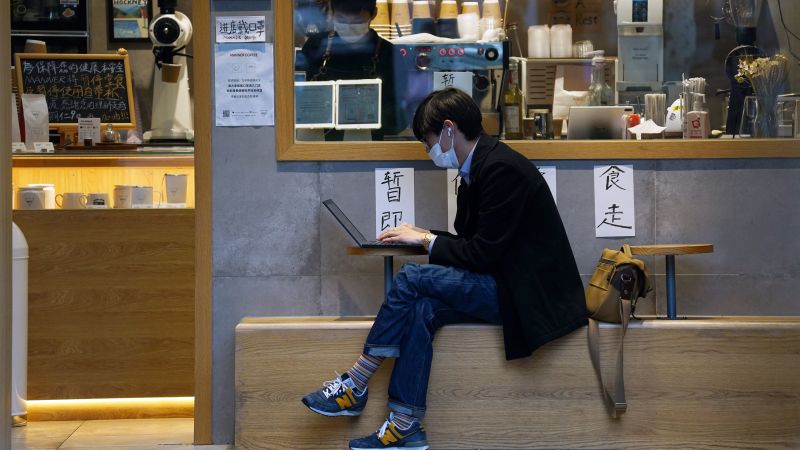[ad_1]
Hong Kong
CNN
—
China has mastered the craft of policing the internet, operating one of the world’s most extensive online censorship and surveillance regimes. With mandatory identity checks on every online platform, it has become almost impossible for users to stay anonymous.
But this rigidly moderated online environment is about to face even stricter controls with the introduction of a state-issued national internet ID.
Instead of requiring individuals to submit their personal information for identity checks separately on each platform, the government now seeks to centralize the process by issuing a virtual ID that will allow users to sign in across different social media apps and websites.
The rules for the new system, currently voluntary, were released in late May and will be implemented in mid-July. It aims to “protect citizens’ identity information, and support the healthy and orderly development of the digital economy,” according to the published rules.
Experts, however, have raised concerns that the new policy will further erode already limited freedom of expression by forcing internet users to relinquish even more control to the state.
Since Chinese leader Xi Jinping took power in 2012, the country has further tightened its grip on the digital space through an army of censors. Deployed around the clock, they remove posts, suspend accounts and help authorities identify critics, quashing any sign of dissent before it can gain traction.
The finalized rules were announced after a proposal that was opened for public comment last summer, a typical step in China’s legislative process. During the course of the public consultation over the past year, the proposal faced backlash from law professors, human rights experts and some internet users. Yet, the finalized rules remained largely similar to the draft.
“This is a state-led, unified identity system capable of real-time monitoring and blocking of users,” said Xiao Qiang, a research scientist studying internet freedom at the University of California, Berkeley. “It can directly erase voices it doesn’t like from the internet, so it’s more than just a surveillance tool – it is an infrastructure of digital totalitarianism.”
Control of China’s vast portion of the global internet has largely been delegated to a decentralized range of different groups, with authorities relying partially on the social media platforms themselves to identify comments deemed problematic. Xiao warned that a centralized system using the internet ID could make it much easier for the government to wipe out a user’s presence across multiple platforms at once.
Shane Yi, a researcher at China Human Rights Defenders, an advocacy group, echoed Xiao’s worries. The system gives the Chinese government expanded power to “do what they want when they see fit” on the internet, as authorities are able to track users’ entire digital trail “from point zero,” she said.

At home, Chinese state-run media has called the internet ID a “bullet-proof vest for personal information” and touted the system as being able to greatly reduce the risk of personal data leaks.
Already, more than six million people have registered for the ID, according to Chinese state-run media Xinhua last month, out of a total estimated online population of more than one billion.
A cybersecurity official from the Ministry of Public Security told Xinhua that the internet ID service was strictly “voluntary,” but the government encourages various industries and sectors to integrate with it.
“Its goal is to provide individuals with a secure, convenient, authoritative and efficient means of identity verification, in support of the development of the digital economy,” the person was quoted as saying.
But experts have also questioned how voluntary the system truly is and highlighted risks of potential data breaches, as personal information is now being collected in a centralized manner.
Haochen Sun, a law professor at the University of Hong Kong, said that, although the law presents the system as voluntary, it could gradually evolve into a system which users may struggle not to opt in to.
“If the government wants to promote this internet ID verification system, it can do so through various arrangements – essentially by encouraging people to adopt it, offering more conveniences in return,” he said.
Sun also raised concerns about the increased risks of data leaks.
“A centralized, nationwide platform inherently creates a single point of vulnerability, making it an attractive target for hackers or hostile foreign actors,” he said.
Government data breaches have occurred around the world. One notable incident in China involved a police database containing the personal information of one billion citizens being leaked online in 2022.
Although the new rules won’t take effect until mid-July, hundreds of apps started trialing the internet ID since last year.
The system was born out of a proposal by a police official early last year. Jia Xiaoliang, a cyber police deputy director in northeastern China who is also a delegate to China’s rubber-stamp legislature, the National People’s Congress, first proposed the system during the Congress’s annual meeting in March 2024.
As soon as the government began soliciting public comments on the proposal last July, experts and legal scholars voiced opposition.
Lao Dongyan, a prominent law professor at Tsinghua University, compared the system to “installing a surveillance device on every individual’s online activity” in a post on Weibo, an X-like Chinese social media platform.
The post was removed soon after, and her account was subsequently suspended from posting for three months, for “violating relevant rules.”
In late May, when the finalized rules were unveiled after a year, almost no criticism could be found online. Xiao explained that it’s not the first time authorities have spaced out the time between a proposal and its implementation, to allow critics to “blow off steam.”
“It’s done deliberately … Many of their measures follow the same pattern, and they’ve proven effective,” he said.
[ad_2]
Source link

